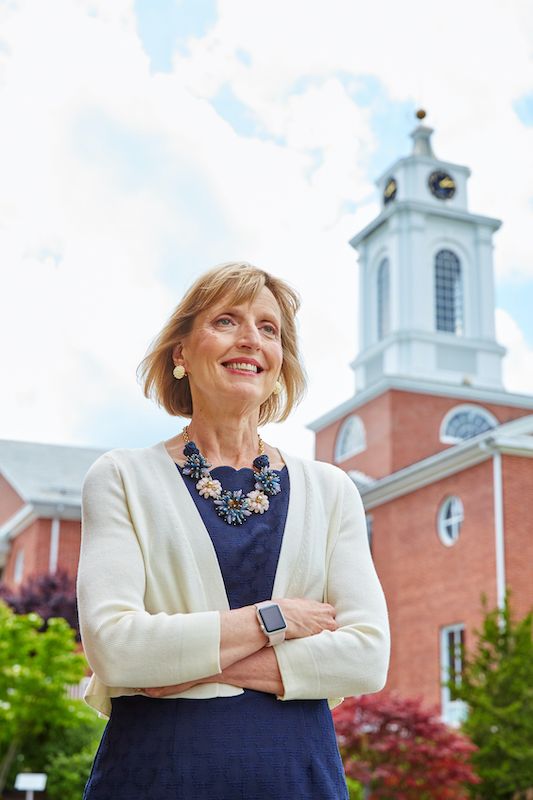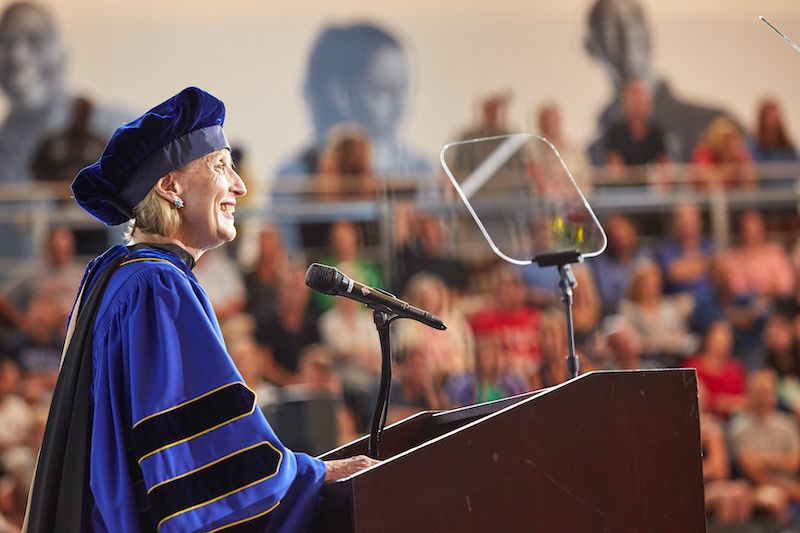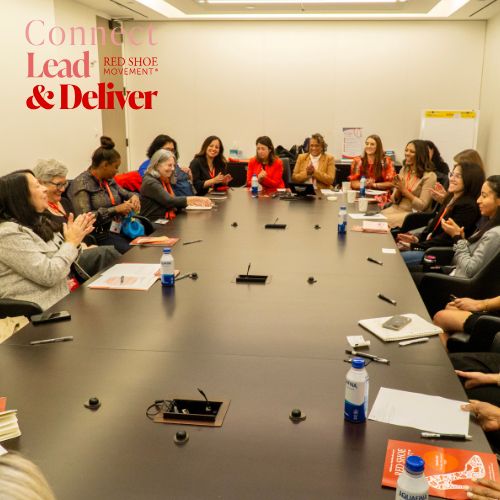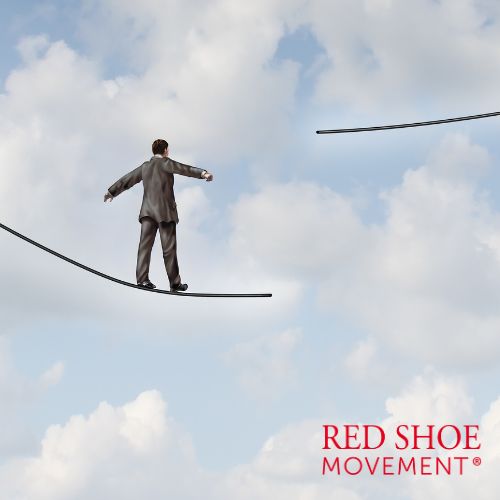If there’s someone pushing for real results in diversity and inclusion at all levels of academia, that’s Dr. Alison Davis-Blake, the eight president of Bentley University.

Before this role, Dr. Davis-Blake was the Dean of the Ross School of Business at the University of Michigan (2011-2016) where she positioned the school globally for its new mission to develop leaders who make a positive difference in the world. Prior to Ross she was the Dean of the Carlson School of Management at the University of Minnesota (2006-2011.)
Dr Davis-Blake was the first female dean at both Carlson and Ross and is Bentley’s second woman president. She is a talented scholar with expertise in strategic human resource management and organizational design for effective management of human capital.
For breaking the glass ceiling in a historically male-dominated sector, and for relentlessly pushing for real results when it comes to full inclusion in academia, we honor Dr. Alison Davis-Blake with the 2020 Hall of Fame.
The influence of great women leaders
Red Shoe Movement—Why do women make great leaders?
Alison Davis-Blake —In a recent study published by Harvard Business Review, researchers found that women in leadership positions are rated equally or more competent than men in leadership positions. I am not surprised by this data which also show that in particular, across thousands of the 360-reviews used for the research, women leaders were highly rated as “excelling” in “taking initiative, acting with resilience, practicing self-development, driving for results, and displaying high integrity and honesty.” I have personally found that women are more likely to engage in integrative (both parties win) negotiations than distributive (win-lose) negotiations in the workplace. It is also my feeling that due to personal experiences of exclusion women can often be more sensitive to the need for diversity and inclusion, thus unleashing organizational potential for creative and innovative solutions.
RSM— How have women helped you along your career?
ADB—Women have been essential to my career as sponsors, mentors, collaborators, and supporters. While the importance of sponsors and mentors is well understood, I think we overlook the vital role of collaborators and supporters. My female collaborators have provided a space where it was safe for me to be myself, to vet concepts, and to test ideas. A space where it is safe to express incomplete thoughts in private with a collaborator or a supporter is vital because so often women face a smaller margin for error in public. I have also been the beneficiary of a great many women who were working on the front lines but who went out of their way to tell me that they were supporting me as a female leader and wanted to see me succeed. Their votes of confidence kept me going during some of my most difficult days.

RSM— You were the first female dean of the Ross School of Business at the University of Michigan and at the time that made you the highest-ranking dean at any U.S. business school. Why did it take so long to have a woman in that position? What changes were you able to implement during your tenure there?
Business schools and fields of study have historically been male dominated. And there is a very, very long road to the deanship. One must obtain a Ph.D., get a good academic job, obtain tenure, become a full professor, and get some administrative experience. That can easily be a 20-year process. And, research is clear that just like the corporate pipeline data reported by McKinsey & Company each year, the academic pipeline is extremely leaky at every stage with fewer women than men (proportionally) advancing to the next stage. Thus, there is a pipeline issue with regards to women achieving the highest ranks of academia, from which administrators are typically chosen.
When I became dean, it was not uncommon for only 10-15% of the full professors in a business school to be women, and, based on that, one would expect very few women to be in senior administrative roles and even fewer to be deans.
While at Ross, I led strategic efforts to increase global study opportunities for MBA and Bachelor of Business Administration students and formed new partnerships with universities around the world. Through this work we expanded activities in India, Japan and South Korea. Domestically we expanded our Executive MBA program to Los Angeles and introduced the Master of Management and Minor in Business programs.
We also completely revamped our undergraduate curriculum to make it more experiential and more integrated, better meeting the needs of today’s learners.
Iris Bohnet, Dean, Harvard Kennedy School shares how to get real results in gender inclusion.
What can be done to get real results?

RSM—54% of university professors who work full time in degree-granting postsecondary institutions are White males while 27% are White females. Only 2% of the following groups are full time professors: Black males, Black females, Hispanic Males and Hispanic females. What is the reason for this disparity in both gender ethnicity and race?
ADB—If doctoral programs don’t begin with a diverse group of students, subsequent stages of the pipeline will continue to be less and less diverse. The long and leaky pipeline is the underlying reason for all of these disparities. This is why efforts such as the Ph.D. Project, which focus on increasing diversity among doctoral students in business, are so critical to generating a diverse set of faculty and administrators for the future.
RSM—Can you share the story of a male champion who supported your ambitions along the way?
ADB—When I was an associate department chair, my chair (who I was in line to replace in several years) spent time introducing me to every key leader on campus and telling those leaders how much they would enjoy working with me. He was an extremely well-connected and well-respected person on campus. Those introductions, which took quite a bit of time to accomplish, were invaluable when I later became a department chair and then senior associate dean.
Want real results? Set the example!
RSM—As a leader, what are you specifically doing to level the playing field for women in academia and elsewhere?
ADB— “Diversity & Inclusion” is a key feature in Bentley University’s strategic plan. We have put hiring practices in place at the university to ensure that we are developing a strong pool of gender, ethnic and racially diverse candidates for every faculty and staff position. I believe that setting the example starts at the top. When making my own personnel decisions, I’ve mandated that all executive searches feature a broad slate of highly qualified candidates. And the results have been very positive. My Provost is a woman of color, my CFO is female, and my Cabinet (the people who report directly to me) has a roughly equal number of women and men. As we work together every day, we demonstrate that the contributions of men and women are equally valued and that both women and men can be successful at the highest levels of Bentley University.
Board diversity is also a top priority for both Bentley’s Board of Trustees and me. We are actively working to add women from all industry sectors and, importantly, women from academia to our Board.
RSM—What has been the most difficult lesson you’ve had to learn to get to where you are?
ADB—Earlier in my career, I imagined that by this point in my life, the playing field would be more level than it is. So, the hardest lesson I have had to learn is that the playing field is not level and will not be level during my lifetime. I sometimes joke that women of my generation have to work twice as hard to get half the credit. While that may not be exactly true, it has been my experience that women still have to produce better and cleaner results to be recognized. And we know that it is true that women are less likely to be paid equitably. While I believe the world is improving and that many leaders, both male and female, are working to change these dynamics, the work world I hoped for when I was younger has not yet materialized.


























































































































































































